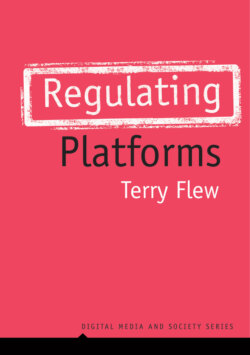Regulating Platforms

Реклама. ООО «ЛитРес», ИНН: 7719571260.
Оглавление
Terry Flew. Regulating Platforms
Table of Contents
List of Tables
List of Illustrations
Guide
Pages
Series Title. Digital Media and Society Series
Regulating Platforms
Copyright Page
Preface
Acknowledgements
Figures
Tables
1 The End of the Libertarian Internet. Revisiting the Californian Ideology
The Three Is: Ideas, Interests, and Institutions
Framing the Internet and Digital Platforms
Free Minds and Free Markets
The New Economy
Freedom and Government
The Open Internet and Romanticism
Openness as Public Policy: Safe Harbour and the Communications Decency Act 1996
The Changing Internet Landscape
From Innovation to Monopoly: The End of the Fifth Long Wave
Platformization of the Internet
Digital Platforms as Media Companies?
Digital Platforms and Populist Politics
Renewed Regulatory Activism
Conclusion
Notes
2 The Platformization of Communications Media. The Platformized Internet
What Is a Platform?
The Evolution of Digital Platforms
Types of Digital Platforms and Digital Platform Companies
Platform Economics and Multisided Markets
Platforms and Infrastructures
Conclusion
3 Issues of Concern. Introduction: Beyond the Techlash
Privacy and Security
Data
Algorithms
Disinformation and Fake News
Hate Speech and Online Abuse
Impact on Media and Creative Industries
Information Monopolies
Conclusion
Notes
4 Digital Platforms and Communications Policy. Introduction
Law, Policy, and Regulation: Three Frames of Communications Policy
National Communications Policy in the Twentieth Century
The Three Is of Communication Policy: Ideas, Institutions, and Interests. Institutions and the New Institutionalism
Ideas and Communication Policy
Interests and Public Policy: Pluralist, Elite, and Class Perspectives
The Three Is in Action: Communications Policy in the Age of the Internet
Conclusion
Notes
5 Platform Regulation and Governance. Introduction: The Shifting Shape of Platform Governance
The Governance Revolution
The Platform Governance Triangle
Regulatory Case Studies
NetzDG Law (Germany)
General Data Protection Regulation (European Union)
News Media and Digital Platforms Mandatory Bargaining Code (Australia)
The Facebook Oversight Board (Global)
The Christchurch Call (New Zealand/International)
Contract for the Web (Global)
Classifying Regulatory Responses to Digital Platform Power
Platform Governance or Platform Regulation?
Conclusion
Notes
6 The Chinese Internet and the Future of Global Internet Governance. Introduction: Liberal Institutionalism and Global Internet Governance
Global Internet Governance under US Leadership
The Internet in China
Early Internet Development in China: Leapfrogging the Information Age
Political Economy of China’s Digital Platform Giants
Distinctive Features of the ‘Chinese Internet’ Model
Fragmented Internet Governance and the Risk of a Global Splinternet
Conclusion
Notes
7 Platform Power and the Future of Internet Policy. Powerful Platforms
The Regulatory Turn and the Return of State Actors
Beyond the Platformized Internet
Enhancing Competition in Digital Markets
Content Regulation and Online Harms
Who Regulates?
Harmful and Illegal Content
Internet Regulation and Media and Communications Policy
Platforms as Intermediaries or as Publishers?
Differentiating Types of Platforms
Conclusion
Notes
Conclusion
Competition, Content, and Data: Three Distinct Points of Platform Regulation
Is Internet Governance Possible?
The Politics of Platform Regulation
Reappraising Regulators
Notes
References
Index
POLITY END USER LICENSE AGREEMENT
Отрывок из книги
terry flew
The book also has a second, more normative focus. It asks the question: why now? After a period of over two decades of broad consensus, at least in the western capitalist world, that the best approach to the internet that policymakers could take was to do very little, why did internet governance and regulation surge onto the global agenda in the mid-2010s, and why has it remained there ever since? We are coming to the end of a long period of ‘soft globalism’ and polycentric governance of the internet at the international level, a period during which the prevailing view was that the best decisions were those made by ‘rough consensus’ in multistakeholder forums where governments were a relatively minor player. Why did we see the resurgence of tech nationalism? Why did governments start to ban the platforms of other countries, triggering concerns about a global ‘splinternet’?
.....
Over the course of the 2010s, there was a significant shift in public sentiment towards the regulation of online content. There was growing concern about the role played by digital platforms in the distribution of online content and about how the relationships between content distributors and users were mediated through such platforms. There was the role played by what Ananny and Gillespie have termed ‘public shocks’, that is, online public events that ‘suddenly highlight a platform’s infrastructural qualities and call it to account for its public implications’ (Ananny and Gillespie, 2017, p. 2). There have been many examples of such public shocks; they include the livestreaming of murders, of sexual assaults, of acts of violence, and, in March 2019, of the Christchurch mosque atrocity, in which an Australian-born terrorist murdered fifty people in two mosques in Christchurch, New Zealand (this was streamed on Facebook Live). A variety of public scandals involving the misuse of personal data have also plagued the largest platform businesses, most notably Facebook, which saw the Cambridge Analytica scandal in 2018: the data of up to 87 million Facebook users were harvested by political campaigns such as the Brexit referendum in 2016 or Donald Trump’s US presidential campaign in the same year.
The surprise election of Trump in 2016 also drew attention to the pervasiveness of fake news on social media platforms, the potential for electoral manipulation by politically motivated actors, and digital platforms’ lack of accountability for news content accessed from their sites (Allcott and Gentzkow, 2017; Benkler et al., 2018; Caplan, 2017; Flew, 2019). In a lively statement of the societal problems presented by the dominant digital platforms, the actor and comedian Sasha Baron Cohen, in his address to the Anti-Defamation League, described these platforms as ‘the greatest propaganda machine in history’:
.....